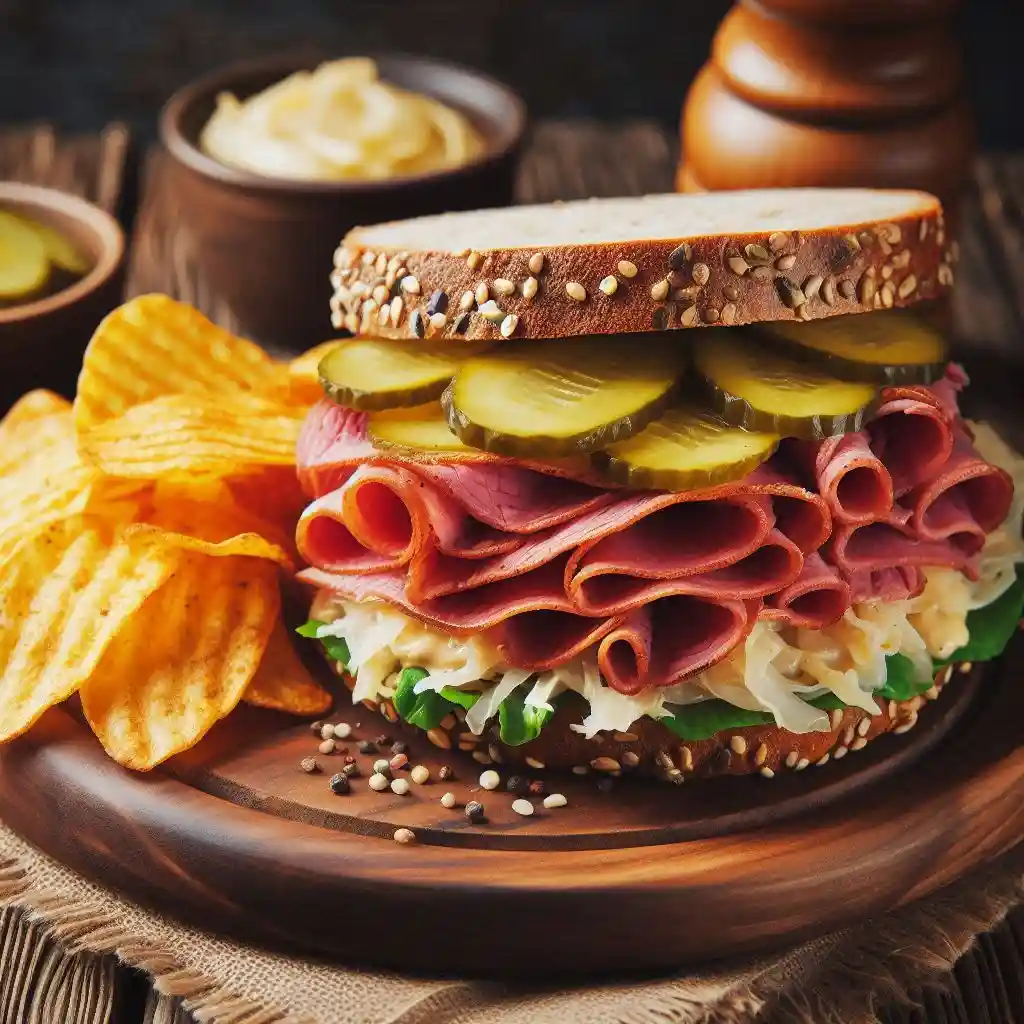How to Tell If Corned Beef Is Bad? The Signs of Spoilage
Corned beef – a staple of many a sandwich, salad, and breakfast plate. But when was the last time you checked the expiration date on that can or package of corned beef in your pantry?
If you’re unsure, you’re not alone. Corned beef can be a breeding ground for bacteria, and consuming spoiled meat can lead to foodborne illness.
So, how can you tell if your corned beef has gone bad? From slimy textures to off-putting odors, we’ll explore the telltale signs of spoiled corned beef and provide you with the knowledge you need to keep your meals safe and delicious.
How to Tell If Corned Beef Is Bad? In a Nutshell

Visual Inspection
- Check for visible mold or slime on the surface of the corned beef. If you notice any, it’s best to err on the side of caution and discard it.
- Look for any signs of rust or corrosion on the can or packaging. If the can is rusty or corroded, it’s likely the corned beef is spoiled.
Smell Test
- Give the corned beef a sniff. If it smells sour, unpleasantly sweet, or has a strong, pungent odor, it’s likely gone bad.
- Compare the smell to fresh corned beef. If it doesn’t have a similar, slightly salty and meaty aroma, it may be spoiled.
Texture Check
- Check the texture of the corned beef. If it’s slimy, soft, or has an unusual consistency, it’s likely spoiled.
- Fresh corned beef should be firm and slightly springy to the touch.
Taste Test (Optional)
- If you’re still unsure, perform a small taste test. If the corned beef tastes sour, bitter, or unpleasantly sweet, it’s likely spoiled.
- Be cautious when performing a taste test, as spoiled corned beef can cause foodborne illness.
Expiration Date
- Check the expiration date or “best by” date on the packaging. If it’s past the expiration date, it’s best to err on the side of caution and discard it.
Other Signs
- If you notice any of the following, it’s likely the corned beef is spoiled:
- Slime or mold on the surface
- Unusual colors or marbling
- Unpleasant or sour smell
- Slimy or soft texture
- Off-tasting or bitter flavor
The Visual Inspection: What to Look for on the Outside

Before you even open the package or can, you can perform a visual inspection to check for signs of spoilage. Here are some things to look for:
- Rust or corrosion: Check the can or packaging for any signs of rust or corrosion. If the can is rusty or corroded, it’s likely that the corned beef inside is spoiled.
- Dents or swelling: Check the can for any dents or swelling. If the can is dented or swollen, it may be a sign that the corned beef has gone bad.
- Leaks or punctures: Inspect the packaging for any signs of leaks or punctures. If the packaging is damaged, it may have allowed bacteria to enter and spoil the corned beef.
- Mold or mildew: Check the outside of the packaging for any signs of mold or mildew. If you notice any, it’s likely that the corned beef is spoiled.
- Unusual colors or stains: Check the packaging for any unusual colors or stains. If you notice any, it may be a sign that the corned beef has gone bad.
The Smell Test: Does It Pass the Sniff Test?
When it comes to detecting spoiled corned beef, your sense of smell can be a powerful tool. A simple sniff test can help you identify if the corned beef has gone bad. Here’s what to look for:
- Off-putting odors: Fresh corned beef should have a slightly salty, meaty aroma. If the corned beef smells strongly of ammonia, sourness, or has a pungent, unpleasant odor, it may be spoiled.
- Sour or bitter smell: If the corned beef smells sour or bitter, it’s likely gone bad. Fresh corned beef should not have a strong acidic or bitter smell.
- Unusual sweetness: If the corned beef smells unusually sweet or has a strong, fruity aroma, it may be a sign of spoilage.
- No smell at all: If the corned beef has no smell at all, it may be a sign that it’s past its prime or has been stored improperly.
What to do if it fails the sniff test
If the corned beef fails the sniff test, it’s best to err on the side of caution and discard it. Consuming spoiled corned beef can lead to foodborne illness, so it’s better to be safe than sorry.
Texture Check: Is It Firm or Slimy?

The texture of corned beef can be a great indicator of its freshness. Here’s what to look for:
- Firmness: Fresh corned beef should be firm to the touch, with a slightly springy texture. If the corned beef feels soft, mushy, or slimy, it may be spoiled.
- Sliminess: Check the surface of the corned beef for any signs of sliminess or stickiness. If it feels slimy or sticky, it’s likely gone bad.
- Dryness: On the other hand, if the corned beef feels dry and crumbly, it may be past its prime or have been stored improperly.
- Grainy texture: If the corned beef has a grainy or rough texture, it may be a sign of spoilage.
What to do if it fails the texture test
If the corned beef fails the texture test, it’s best to discard it. Consuming spoiled corned beef can lead to foodborne illness, and a slimy or soft texture is often a sign of bacterial growth.
Tips for storing corned beef
To prevent spoilage, make sure to store corned beef in a cool, dry place, such as the refrigerator or freezer. Always check the expiration date and follow proper storage instructions to keep your corned beef fresh for as long as possible.
The Taste Test: A Last Resort (But Not Recommended)
While we don’t recommend performing a taste test to determine if corned beef is spoiled, we understand that some people may still want to try it. Please exercise extreme caution if you decide to perform a taste test, as consuming spoiled corned beef can lead to foodborne illness.
What to look for in a taste test
If you still want to perform a taste test, here’s what to look for:
- Off flavors: If the corned beef tastes sour, bitter, or has an unusual, unpleasant flavor, it may be spoiled.
- Metallic taste: If the corned beef has a metallic or tinny taste, it may be a sign of spoilage.
- Unusual sweetness: If the corned beef tastes unusually sweet or has a strong, fruity flavor, it may be a sign of spoilage.
Why we don’t recommend the taste test
Performing a taste test can be risky, as even a small amount of spoiled corned beef can cause foodborne illness. Additionally, some types of bacteria, such as Clostridium botulinum, can produce toxins that are odorless and tasteless, making it difficult to detect spoilage through taste alone.
Instead, rely on other methods
We recommend relying on the visual inspection, smell test, and texture check to determine if corned beef is spoiled. These methods are safer and more reliable than a taste test. If in doubt, it’s always best to err on the side of caution and discard the corned beef.
Expiration Dates: When to Use Them and When to Ignore Them
Expiration dates can be a helpful guide in determining the freshness of corned beef, but they’re not always a hard and fast rule. Here’s what you need to know:
What do expiration dates mean?
Expiration dates, also known as “best by” or “use by” dates, indicate the manufacturer’s recommendation for the peak quality and freshness of the corned beef. They don’t necessarily indicate spoilage, but rather the point at which the product may start to degrade in quality.
When to use expiration dates
- Canned corned beef: For canned corned beef, expiration dates are generally a good indicator of freshness. If the expiration date has passed, it’s best to err on the side of caution and discard the can.
- Packaged corned beef: For packaged corned beef, expiration dates can be a good guide, but it’s also important to check the packaging for any signs of damage or leakage.
When to ignore expiration dates
- Proper storage: If you’ve stored the corned beef properly, in a cool, dry place, and it’s still within a reasonable timeframe of the expiration date, it may still be safe to consume.
- Visual inspection: If the corned beef looks, smells, and tastes fresh, it may still be safe to consume, even if the expiration date has passed.
Remember, expiration dates are just a guide
While expiration dates can be helpful, they’re not a foolproof way to determine spoilage. Always use your best judgment and consider other signs of spoilage, such as sliminess, mold, or an off smell, when deciding whether to consume corned beef.
Mold, Slime, and Other Visible Signs of Spoilage
One of the most obvious signs of spoiled corned beef is the presence of mold, slime, or other visible signs of spoilage. Here are some things to look out for:
- Mold: Check the surface of the corned beef for any signs of mold, such as white, green, or black patches. If you notice any mold, it’s best to discard the corned beef immediately.
- Slime: Slime or a slimy texture is another sign of spoilage. If the corned beef feels slimy or sticky to the touch, it’s likely gone bad.
- Unusual colors: If the corned beef has an unusual color, such as green, blue, or black, it may be a sign of spoilage.
- Slimy or soft texture: If the corned beef has a slimy or soft texture, it may be a sign of spoilage.
- Rancid or sour smell: If the corned beef has a strong, unpleasant odor, it may be a sign of spoilage.
What to do if you notice visible signs of spoilage
If you notice any of these visible signs of spoilage, it’s best to discard the corned beef immediately. Consuming spoiled corned beef can lead to foodborne illness, so it’s always better to err on the side of caution.
Preventing spoilage
To prevent spoilage, make sure to store corned beef in a cool, dry place, such as the refrigerator or freezer. Always check the expiration date and follow proper storage instructions to keep your corned beef fresh for as long as possible.
Unusual Colors and Marbling: What’s Normal and What’s Not
When it comes to corned beef, unusual colors and marbling can be a sign of spoilage. Here’s what you need to know:
- Normal colors: Corned beef can have a range of colors, including pink, red, or brown. These colors are normal and don’t necessarily indicate spoilage.
- Unusual colors: If the corned beef has an unusual color, such as green, blue, or black, it may be a sign of spoilage. This can be due to the presence of bacteria, mold, or other contaminants.
- Marbling: Marbling refers to the streaks of fat that run through the corned beef. While some marbling is normal, excessive marbling can be a sign of spoilage.
- Unusual marbling patterns: If the corned beef has an unusual marbling pattern, such as streaks of fat that are too long or too thick, it may be a sign of spoilage.
What to do if you notice unusual colors or marbling
If you notice any unusual colors or marbling patterns, it’s best to err on the side of caution and discard the corned beef. Consuming spoiled corned beef can lead to foodborne illness, so it’s always better to be safe than sorry.
Preventing spoilage
To prevent spoilage, make sure to store corned beef in a cool, dry place, such as the refrigerator or freezer. Always check the expiration date and follow proper storage instructions to keep your corned beef fresh for as long as possible.
When in Doubt, Throw It Out: The Risks of Spoiled Corned Beef
When it comes to corned beef, it’s always better to err on the side of caution. If you’re unsure whether the corned beef is spoiled or not, it’s best to discard it. Consuming spoiled corned beef can lead to serious health risks, including foodborne illness and even death.
The Risks of Spoiled Corned Beef
Consuming spoiled corned beef can lead to a range of health problems, including:
- Foodborne illness: Spoiled corned beef can contain harmful bacteria, such as Salmonella, E. coli, and Listeria, which can cause foodborne illness.
- Gastrointestinal symptoms: Consuming spoiled corned beef can cause gastrointestinal symptoms such as nausea, vomiting, diarrhea, and stomach cramps.
- Serious health complications: In rare cases, consuming spoiled corned beef can lead to serious health complications, such as kidney failure, meningitis, and even death.
The Importance of Proper Storage
To prevent spoilage, it’s essential to store corned beef properly. Here are some tips:
- Store corned beef in a cool, dry place, such as the refrigerator or freezer.
- Check the expiration date and follow proper storage instructions.
- Keep corned beef away from direct sunlight and heat sources.
- Avoid cross-contamination by storing corned beef in airtight containers.
Conclusion
When in doubt, throw it out. If you’re unsure whether the corned beef is spoiled or not, it’s always better to err on the side of caution and discard it.
Remember, the risks of spoiled corned beef are serious and can have long-lasting consequences for your health. Always prioritize food safety and take the necessary precautions to ensure your corned beef is fresh and safe to consume.
FAQs
Q: How can I tell if corned beef is spoiled?
A: Corned beef can spoil if it’s not stored properly or if it’s past its expiration date. Look for signs of spoilage such as an off smell, slimy texture, or mold growth.
Q: What are the signs of spoilage in corned beef?
A: Signs of spoilage in corned beef include an off smell, slimy texture, mold growth, and an unusual color or marbling pattern.
Q: Can I still eat corned beef if it’s past its expiration date?
A: It’s generally not recommended to eat corned beef if it’s past its expiration date. Consuming spoiled corned beef can lead to foodborne illness.
Q: How can I store corned beef to prevent spoilage?
A: Store corned beef in a cool, dry place, such as the refrigerator or freezer. Check the expiration date and follow proper storage instructions.
Q: What are the risks of consuming spoiled corned beef?
A: Consuming spoiled corned beef can lead to foodborne illness, gastrointestinal symptoms, and in rare cases, serious health complications.
Q: Can I freeze corned beef to extend its shelf life?
A: Yes, freezing corned beef can help extend its shelf life. Make sure to follow proper freezing and storage instructions.
Q: How long can I store corned beef in the refrigerator?
A: Corned beef can be stored in the refrigerator for up to 2 weeks. Always check the expiration date and follow proper storage instructions.
Q: Can I reheat corned beef if it’s past its expiration date?
A: It’s generally not recommended to reheat corned beef if it’s past its expiration date. Consuming spoiled corned beef can lead to foodborne illness.

DK Jacks is a passionate food enthusiast, recipe developer, and culinary explorer. With a love for both traditional and innovative flavors, DK brings a fresh perspective to the kitchen. When not experimenting with new ingredients, you’ll find DK capturing food moments through the lens or sharing cooking tips with fellow foodies.🍽️📸✨






